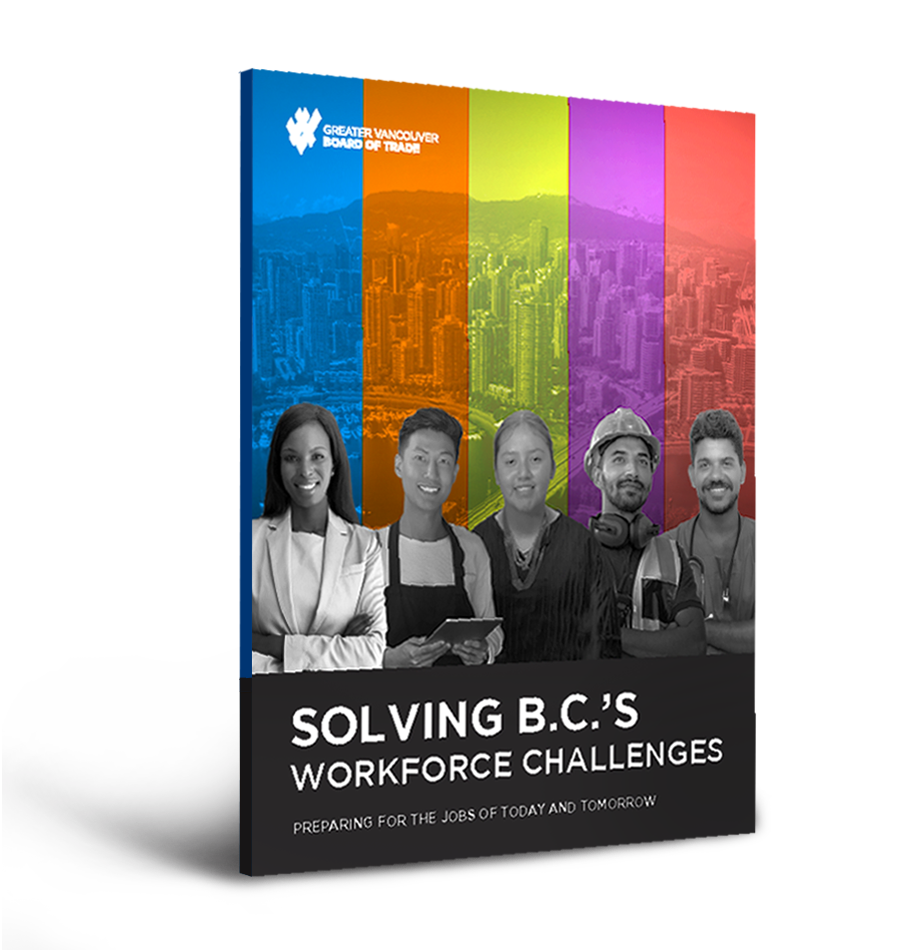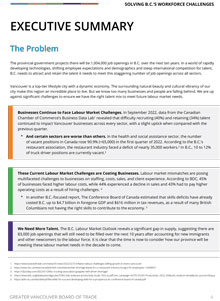A path to prosperity: Solving B.C.’s Workforce Challenges
For Immediate Release
February 2, 2023
A path to prosperity: Solving B.C.'s Workforce Challenges
VANCOUVER, B.C. —The Greater Vancouver Board of Trade has released a new report that lays out ambitious short, medium and long-term steps to address existing labour challenges in British Columbia and fill the staggering number of job openings expected over the next ten years.
B.C. has over 150,000 existing job vacancies and a projected 700,000 individuals set to retire in the next decade. Businesses in Metro Vancouver regularly rank difficulty attracting, recruiting and retaining talent among their most significant barriers in the quarterly Canadian Survey of Business Conditions in Metro Vancouver.
‘Solving B.C.’s Workforce Challenges’ is a roadmap with 65 recommendations to align educational pathways with in-demand jobs, make B.C. a global leader in digital skills, and ensure everyone has access to gainful employment. The report is based on months of research and ongoing conversations with over 5,000 members, educational institutions, government, and community partners.
“The employment landscape is evolving more rapidly than ever before. We are proposing a comprehensive strategy to develop and attract the talent required for the jobs of an increasingly digital world, leveraging existing data and industry expertise,” said Bridgitte Anderson, President and CEO of the Greater Vancouver Board of Trade. “Government, educational institutions, and the business community need to form a new partnership and embrace innovative approaches to ensure our economy can manage an aging demographic while becoming a global hub for technology and innovation, with sustainability and resilience at the core.”
The report articulates a series of recommendations for the provincial government:
Immediate action: With record job vacancy rates, maximizing labour force participation is critical.
- Remove registration requirements for out-of-province healthcare workers, and work with professional associations/bodies to drive faster recognition of foreign credentials, especially in high-demand occupations.
- Streamline the employer registration process for the Temporary Foreign Worker program from 8 – 10 weeks to a maximum of 3 days.
- Invest to make B.C.’s economy inclusive for all by promoting new approaches for those underrepresented in the workforce, including Indigenous Peoples and those with disabilities.
- Consider an Office for Indigenous Employment that brings together post-secondary institutions, the Indigenous Employment Service Agencies, and all other organizations in the sector that could be a one-stop shop for Indigenous individuals seeking employment and employers seeking to hire.
- Increase investments in experiential learning opportunities, including co-ops and work-integrated learning programs.
Digital first: From agriculture to engineering, every job is a technology job, and sector-specific programs and applications have become increasingly specialized. B.C. needs to revamp skills training, government operations, and our education system to ensure we have world-leading digital skills.
- Create a Digital Skills Index for British Columbia that ranks workplace digital skills readiness across all age groups, setting a goal for B.C. to be the top jurisdiction for digital skills in North America.
- Offer incentives for mid-career professionals to upgrade their digital skills and remain competitive in the labour market.
- Aspire to transform government operations with a digital-minded leadership for all government operations, including permitting and licensing.
- Set goals and provide assistance for SMEs to sell online and measure the digital intensity of British Columbia’s SMEs.
- In collaboration with post-secondary institutions and the private sector, increase the number of microcredential programs offered, with a focus on in-demand occupations, to reduce the skills gap and provide more opportunities for British Columbians.
Reshaping how we generate talent: Steps like introducing coding in grades K-12 are a great start, but government needs to do more to create job-specific education pathways.
- Create a B.C. industry-government-post-secondary Education Roundtable to focus on the future of the labour market and aligning research funding with business needs.
- Start early by strengthening bonds between our K – 12 system and post-secondary institutions for demonstrated labour market needs. Support high school laddering programs that benefit younger populations in areas of particular importance to the B.C. economy. For example: expanding/piloting high school programs in areas focused on coding, cybersecurity, nursing, and mass timber.
- Use the B.C. Labour Market Outlook data to inform the design of extra skilling, reskilling, and training policies and programs, and communicate how these data are influencing policy decisions.
- Work with the federal government to Review and revise the National Occupation Classification (NOC) codes more regularly to better reflect the needs and true state of the labour market.
The report also includes an appendix with related recommendations for making Greater Vancouver the best region to live and do work. Recognizing that the labour market challenges facing businesses are impacted by broader societal factors, this appendix explores ways of improving housing affordability, enhancing public transit connectivity, increasing childcare availability and investing in mental health supports.
…………………………………………………………………………
Quotes:
"Our business is nothing without our talent. B.C.'s world-renowned entertainment industry has experienced a surge in production which has led to a skills shortage challenge. If we want to continue to position ourselves as industry leaders, we must innovate how we attract, train and retain the people we need to drive the technology that fuels these productions. And in doing so, we need to ensure that these resources are inclusive so that the content we create reflects a spectrum of voices and perspectives. Cultivating and growing the future generation is paramount to not only Thunderbird's success but also that of every other business in our industry."
Jennifer Twiner McCarron, CEO and Chair, Thunderbird Entertainment Group
"Construction and the trades are literally building the foundations for the future of our communities but recruiting and retaining skilled workers has become increasingly difficult. Record job vacancies are hampering our ability to tackle the most pressing challenges in our region and ensure that we're equipped to grow and thrive in a rapidly changing global economy. As we look at the expected wave of retirements and a substantial shift in the kinds of skills required for the jobs of tomorrow, it's clear that we need to take a collaborative approach to building the workforce of tomorrow.
Kari Yuers, President and CEO, Kryton International Inc.
Download Report
Download Executive Summary
…………………………………………………………………………
-30-
About the Greater Vancouver Board of Trade:
Since its inception in 1887, the Greater Vancouver Board of Trade has been recognized as Western Canada's leading business association, engaging our members to inform public policy at all levels of government and empowering them to succeed and prosper in the global economy. With a Membership whose employees comprise one-third of B.C.'s workforce, we are the largest business association between Victoria and Toronto. We leverage this collective strength, facilitating networking opportunities, and providing professional development through unique programs. In addition, we operate one of the largest events platforms in the country, providing a stage for national and international thought leaders to enlighten B.C.'s business leaders.
Media contact:
Victor Young
Communications Manager
Greater Vancouver Board of Trade
604-640-5450 | media@boardoftrade.com


